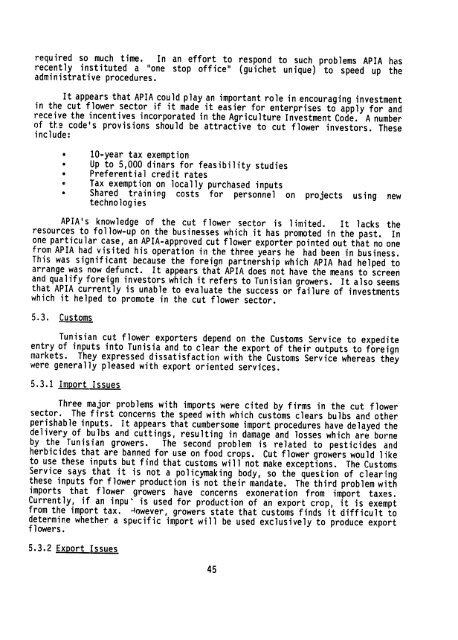APIP Agricultural Policy Implementation Project
APIP Agricultural Policy Implementation Project
APIP Agricultural Policy Implementation Project
You also want an ePaper? Increase the reach of your titles
YUMPU automatically turns print PDFs into web optimized ePapers that Google loves.
equired so much time. In an effort to respond to such problems APIA has<br />
recently instituted a "one stop office" (guichet unique) to speed up the<br />
administrative procedures.<br />
Itappears that APIA could play an important role inencouraging investment<br />
in the cut flower sector ifit made it easier for enterprises to apply for and<br />
receive the incentives incorporated inthe Agriculture Investment Code. A number<br />
of the code's provisions should be attractive to cut flower investors. These<br />
include:<br />
0 10-year tax exemption<br />
* Up to 5,000 dinars for feasibility studies<br />
* Preferential credit rates<br />
0 Tax exemption on locally purchased inputs<br />
• Shared training costs for personnel on projects using new<br />
technologies<br />
APIA's knowledge of the cut flower sector is limited. It lacks the<br />
resources to follow-up on the businesses which it has promoted in the past. In<br />
one particular case, an APIA-approved cut flower exporter pointed out that no one<br />
from APIA had visited his operation inthe three years he had been inbusiness.<br />
This was significant because the foreign partnership which APIA had helped to<br />
arrange was now defunct. It appears that APIA does not have the means to screen<br />
and qualify foreign investors which itrefers to Tunisian growers. Italso seems<br />
that APIA currently is unable to evaluate the success or failure of investments<br />
which it helped to promote in the cut flower sector.<br />
5.3. Customs<br />
Tunisian cut flower exporters depend on the Customs Service to expedite<br />
entry of inputs into Tunisia and to clear the export of their outputs to foreign<br />
markets. They expressed dissatisfaction with the Customs Service whereas they<br />
were generally pleased with export oriented services.<br />
5.3.1 Import Issues<br />
Three major problems with imports were cited by firms in the cut flower<br />
sector. The first concerns the speed with which customs clears bulbs and other<br />
perishable inputs. Itappears that cumbersome import procedures have delayed the<br />
delivery of bulbs and cuttings, resulting in damage and losses which are borne<br />
by the Tunisian growers. The second problem is related to pesticides and<br />
herbicides that are banned for use on food crops. Cut flower growers would like<br />
to use these inputs but find that customs will not make exceptions. The Customs<br />
Service says that it is not a policymaking body, so the question of clearing<br />
these inputs for flower production isnot their mandate. The third problem with<br />
imports that flower growers have concerns exoneration from import taxes.<br />
Currently, if an inpu" is used for production of an export crop, it is exempt<br />
from the import tax.<br />
4 owever, growers state that customs finds it difficult to<br />
determine whether a specific import will be used exclusively to produce export<br />
flowers.<br />
5.3.2 Export Issues<br />
45

















